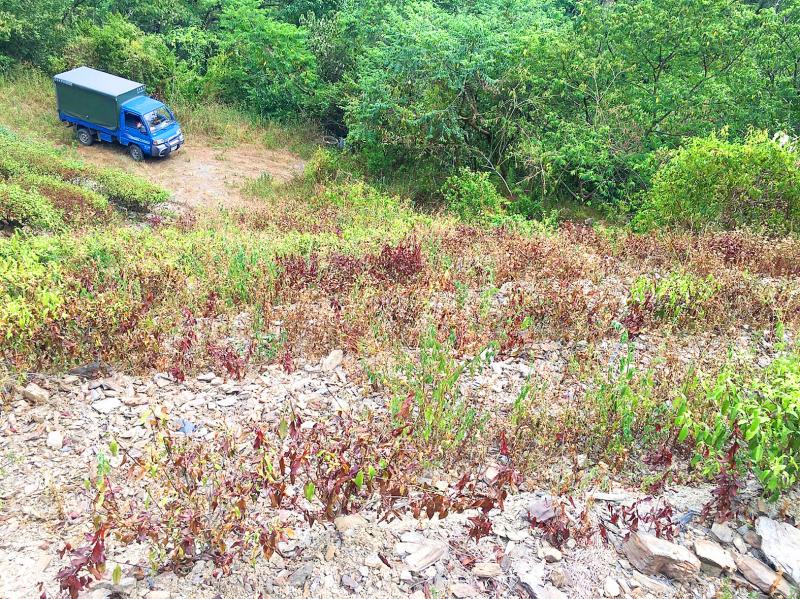Record-low rainfall in Yilan County this year has raised fears that harvests might be affected, the county’s weather bureau said on Tuesday.
Yilan is reliant on rainwater brought by typhoons, which generally arrive from July to September, but there have been none this year. The county only had 11mm of rain last month, the least recorded in 15 years, it said.
Yilan said crops are suffering due to the water shortage, with reports of withered tea shrubs in the Dongshan Township (冬山) region and more than two-thirds of newly planted tea trees dying.

Photo courtesy of Fu Tea
Township residents said that over the past five decades, the area has seen little to no rainfall, leading to mountain streams drying up and depriving tea trees of a valuable water source.
Chen Wan-hui (陳琬惠), the Taiwan People’s Party candidate for Yilan County commissioner, said that Yilan had never needed a reservoir, but due to climate change the county might see less rain.
The county government should prepare, and start setting up water storage facilities while stepping up water reclamation measures, Chen said.
The bureau said it would ask the Council of Agriculture to issue subsidies if the area of affected tea trees in Dongshan exceeds 20 percent.
Meanwhile, Yilan growers are concerned about an alleged export ban on Asian pear sprigs from China’s Shandong Province, the primary type used to graft the “Lieutenant General” Asian pear cultivar in Taiwan, the county’s Agriculture Department said.
As cuttings cannot acclimatize to Taiwan’s weather, new cuttings have to be grafted every year.
The bureau said that the cultivar is planted over 43 hectares in Taiwan, and has an annual profit margin of NT$100 million (US$3.34 million).
The cultivar is further subdivided into two types, the “fengshui pear” (豐水), using Japanese cuttings, and the “golden pear” (黃金), which uses cuttings from Shandong Province, the bureau said.
Growers placed orders to China last year for “golden pear” cuttings, farmer Weng Sung-ken (翁松根) said.
They were supposed to arrive in Taiwan by December last year, but arrived in late January, Weng said, adding that the delay caused growers to miss the window during which grafting is best conducted, leading to a drastic decrease in pears.
“When we reached out this year to make more orders, the intermediaries told us China would not be exporting cuttings anymore,” Weng said.
The Sansing Township (三星) Farmers’ Association said it would be holding meetings on how to help growers obtain necessary cuttings, adding that, in the worst-case scenario, they should consider grafting other kinds of pears.

Taiwan has received more than US$70 million in royalties as of the end of last year from developing the F-16V jet as countries worldwide purchase or upgrade to this popular model, government and military officials said on Saturday. Taiwan funded the development of the F-16V jet and ended up the sole investor as other countries withdrew from the program. Now the F-16V is increasingly popular and countries must pay Taiwan a percentage in royalties when they purchase new F-16V aircraft or upgrade older F-16 models. The next five years are expected to be the peak for these royalties, with Taiwan potentially earning

STAY IN YOUR LANE: As the US and Israel attack Iran, the ministry has warned China not to overstep by including Taiwanese citizens in its evacuation orders The Ministry of Foreign Affairs (MOFA) yesterday rebuked a statement by China’s embassy in Israel that it would evacuate Taiwanese holders of Chinese travel documents from Israel amid the latter’s escalating conflict with Iran. Tensions have risen across the Middle East in the wake of US and Israeli airstrikes on Iran beginning Saturday. China subsequently issued an evacuation notice for its citizens. In a news release, the Chinese embassy in Israel said holders of “Taiwan compatriot permits (台胞證)” issued to Taiwanese nationals by Chinese authorities for travel to China — could register for evacuation to Egypt. In Taipei, the ministry yesterday said Taiwan

Taiwan is awaiting official notification from the US regarding the status of the Agreement on Reciprocal Trade (ART) after the US Supreme Court ruled US President Donald Trump's global tariffs unconstitutional. Speaking to reporters before a legislative hearing today, Premier Cho Jung-tai (卓榮泰) said that Taiwan's negotiation team remains focused on ensuring that the bilateral trade deal remains intact despite the legal challenge to Trump's tariff policy. "The US has pledged to notify its trade partners once the subsequent administrative and legal processes are finalized, and that certainly includes Taiwan," Cho said when asked about opposition parties’ doubts that the ART was

If China chose to invade Taiwan tomorrow, it would only have to sever three undersea fiber-optic cable clusters to cause a data blackout, Jason Hsu (許毓仁), a senior fellow at the Hudson Institute and former Chinese Nationalist Party (KMT) legislator, told a US security panel yesterday. In a Taiwan contingency, cable disruption would be one of the earliest preinvasion actions and the signal that escalation had begun, he said, adding that Taiwan’s current cable repair capabilities are insufficient. The US-China Economic and Security Review Commission (USCC) yesterday held a hearing on US-China Competition Under the Sea, with Hsu speaking on